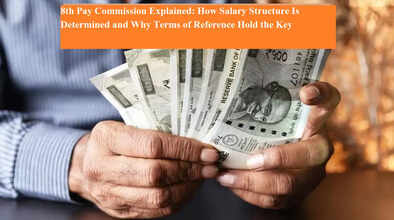8th Pay Commission Explained: How Salary Structure Is Determined and Why Terms of Reference Hold the Key

The Central Government’s approval of the 8th Pay Commission has set the stage for a major overhaul in salaries, allowances, and pensions for nearly 50 lakh government employees and 65 lakh pensioners across India. Since the announcement in January 2025, preparations have been underway, but a critical question remains—how will these changes impact the take-home pay of employees? Let’s break down the salary structure, understand the role of the Terms of Reference (ToR), and examine what this means for government staff.
Understanding the Current Salary Composition
A central government employee’s salary is a combination of multiple components, with Basic Pay forming the foundation. This is determined by the employee’s grade and designation, making up roughly 51.5% of the total salary.
The remaining portion is divided among various allowances:
-
Dearness Allowance (DA): Around 30.9% of the salary, revised periodically to offset inflation.
-
House Rent Allowance (HRA): Approximately 15.4%, provided to employees not staying in government accommodation.
-
Transport Allowance (TA): Close to 2.2%, aimed at covering daily commute expenses.
This structure ensures that salaries remain partly inflation-proof while addressing employees’ housing and travel needs.
The Role of Terms of Reference (ToR)
The Terms of Reference are a crucial part of any pay commission’s functioning. Essentially, ToR acts as a guideline framework, defining the scope of work and the specific areas the commission needs to review. It outlines:
-
Which aspects of salary and allowances will be examined.
-
Whether pension revisions will be included.
-
Possible updates to retirement benefits and other perks.
In short, the ToR decides the boundaries within which the commission operates. Without a finalized ToR, the commission cannot begin a detailed assessment, which explains the current delay.
Why ToR Approval is Delayed
According to sources, the finalization of the ToR has been slower than expected, causing anxiety among employees and pensioners who are eagerly awaiting pay revisions. This delay could potentially push back the implementation timeline of the 8th Pay Commission’s recommendations.
Expected Changes Under the 8th Pay Commission
While the official recommendations are yet to be drafted, past trends suggest a focus on:
-
Increased Basic Pay: To ensure better cost-of-living adjustments.
-
Revised Allowances: Possible hikes in DA, HRA, and TA to match inflation rates.
-
Better Retirement Benefits: Review of pension structures to provide greater post-retirement financial security.
Experts believe that the ToR will also determine whether the commission will take into account economic conditions, inflation forecasts, and the government’s fiscal capacity while deciding pay hikes.
Impact on Employees and Pensioners
For serving employees, any revision in basic pay and allowances directly affects their monthly earnings and retirement savings. For pensioners, changes in the pay matrix influence pension amounts, ensuring they keep pace with rising living costs.
However, some economists caution that while salary hikes can boost morale and spending power, they also increase the government’s long-term financial commitments. Balancing employee welfare with fiscal responsibility will be a key challenge for the commission.
Bottom Line
The 8th Pay Commission promises to bring significant changes, but its real impact will depend largely on the Terms of Reference—the blueprint that will shape every recommendation. Until the ToR is finalized, the process remains in a holding pattern, leaving millions of employees and pensioners waiting for clarity on their financial future.

